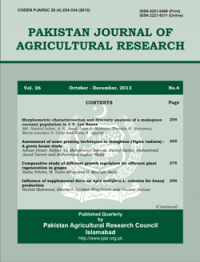Integrated application of mineral fertilizers, organic amendments and microbial inoculants not only maximize the crop production and economic returns but also improve the soil health. A two years field study was conducted in the farm of Barani Agricultural Research Institute, Chakwal (32o55’33”N, 72 o43’30”E) to evaluate the integrated impact of vermicompost (VC) and microbial inoculants on wheat yield and economics. Eight treatments i.e., control; recommended dose of fertilizers (160:150:50) NPK in kg ha-1; VC @ 4t ha-1; PSB; Recommended fertilizers + VC @ 4t ha-1; Recommended fertilizers + PSB; VC @ 4t ha-1 + PSB; Recommended fertilizers + VC @ 4t ha-1 + PSB were tested in the experiment using various combinations of vermicompost (VC) @ 4t ha-1 and phosphorus solubilizing bacterial (PSB) as microbial inoculants along with recommended dose of NPK fertilizers (RDF) were applied at the time of sowing. The combined application of VC, PSB and RDF increased the wheat yield 2684 kgha-1 and 3179 kgha-1 while the yield recorded in control was 572 and 887 kgha-1 for two consecutive years. Same trend was observed in other yield attributes i.e. no. of tillers m-2 (T8; 348, 352 vs control; 240, 238), spike length (T8; 12cm, 14cm vs control; 9.10, 10.9), no. of grains spike-1 (T8; 63, 65 vs control; 34, 28) during both years, respectively. It has also mended the soil health by improving the soil OM status (0.58%), NO3-N (13ppm) and phosphorus (9.4ppm) contents. The economic analysis revealed that maximum net returns were found in integrated nutrient application (RDF, VC and microbial inoculants) i.e., Rs. 67,044 ha-1 for 2017-18 and Rs. 1,03,202 ha-1 for 2nd year and minimum returns in control.







